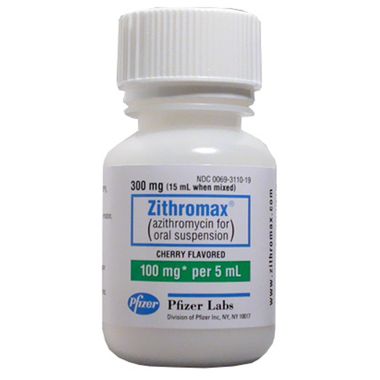SAVE 17% OFF 17% OFF Use Code LUCKY17 *

Zithromax for Dogs & Cats - 100mg/5ml Susp 15ml Bottle - [Bacterial Infections Treatment]
- Description
- Ingredients
- Directions
- FAQ
- Reviews
Description
Zithromax is a broad-spectrum antibiotic used to treat susceptible bacterial infections. Zithromax is one of the few antibiotics that is safe for rabbits. It treats a multitude of susceptible bacterial infections in dogs and cats, as well, and comes in an easy-to-dose oral suspension.
Key Benefits:
- Treats susceptible bacterial infections in dogs, cats, and other small animals
- Treats upper respiratory infections, skin infections, and more
- Easily dosed oral suspension form
How it works
It prevents bacteria from producing proteins that are essential to their growth and reproduction. It therefore stops the spread of infection, allowing the body's immune system to kill the bacteria.
Indication
Zithromax suspension is a liquid antibiotic for dogs and cats that may be useful for a variety of bacterial and parasitic infections. Treats infections of ears, lungs and skin.
Ingredients
Active Ingredients:
Azithromycin
Directions
Mixing Directions:
Tap Bottle to loosen powder. Add listed amount of water to the bottle. After mixing, use within 10 days. Discard after full dosing is completed. After mixing, store suspension at 41 to 86 degrees F. Oversized bottle provides extra space for shaking.
Shake Well Before Using.
Administration of Liquid:
For liquids, shake well before accurately measuring the dose. If using the suspension, give on empty stomach. Give medication as directed by your veterinarian. This medication is usually given once or twice daily. Read and follow the label carefully. Give the exact amount prescribed and only as often as directed. Missed doses reduce the effectiveness of therapy. Give this medication for as long as your veterinarian directs. Finish the entire course of treatment. Ideally, give the medication at the same time daily.
Storage:
Store suspension between 5-25°C(41-77°F). Oral suspension should be stored at room temperature before reconstitution. After reconstitution, store at room temperature for 10 days and then discard.
Cautions
Keep out of the reach of children and pets. Use with caution in pets that are pregnant or nursing. Use with caution in pets suffering from hepatic disease. Do not use this medication in pets with a known allergy or hypersensitivity to any macrolide antibiotic. Common side effects in small animals include vomiting, reduced appetite, and diarrhea. Zithromax may also interact with some other medications. Therefore, inform your veterinarian of any and all medications your pet may be taking. This is especially important if your pet is currently taking cisapride or oral antacids. Finally, if you notice any behavioral or physiological changes in your pet while administering this medication, contact your veterinarian immediately.
Side Effects:
Zithromax should not be used in animals with known hypersensitivity or allergy to it or other macrolide antibiotics. In addition, it should be used with great caution if at all when there is preexisting liver disease. Gastrointestinal side effects may include vomiting, diarrhea, or abdominal pain. Angioedema and cholestatic jaundice have been reported rarely in treated humans. Cardiac arrhythmias, including ventricular tachycardia, may be precipitated by Zithromax. Renal dysfunction, including interstitial nephritis and acute renal failure, may occur secondary to Zithromax treatment and liver function may be affected.
Precautions:
Zithromax should not be given to pets who have an allergy to it or similar antibiotics. Pets with liver disease should take this medication cautiously and only if the benefits outweigh the risks. The risks to pregnant/lactating females are unknown.
This drug is FDA-approved for human use. However, it is common practice for veterinarians to prescribe such drugs for use in dogs and cats.
Drug Interactions:
Zithromax may elevate serum digoxin levels. When ergotamine or dihydroergotamine are concurrently administered with Zithromax ergot toxicity may occur. Zithromax causes a decrease in the clearance of triazolam and thus an increase in its pharmacologic effects Pimozide is contraindicated in patients receiving Zithromax, and vice versa death may result Animals being treated with cisapride should not be given Zithromax or other macrolide antibiotic Drugs metabolized by cytochrome P450 e.g. carbamazepine, terfenadine, cyclosporine, hexobarbital, and phenytoin will have their serum levels elevated by Zithromax Oral antacids reduce the absorption of Zithromax.
FAQ
- Effective in the treatment of targeted respiratory, skin, and other infections.
- Given as a liquid so it can be accurately dosed in the smallest of animals.
- Liquid is easy to administer and it can be given safely in several species of small animals.
Not for use in animals hypersensitive (allergic) to it or drugs similar to it or other macrolide antibiotics.
Use with caution in animals with liver disease. The safety of the medication in pregnant and lactating animals (female animals nursing their young) has not been determined. Consult with your veterinarian regarding the physical examinations and laboratory testing necessary prior to and during treatment with Zithromax.


